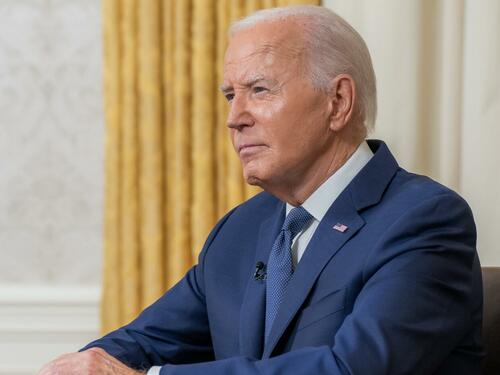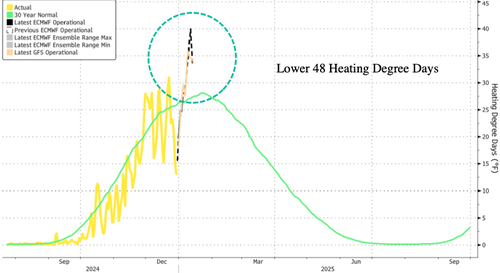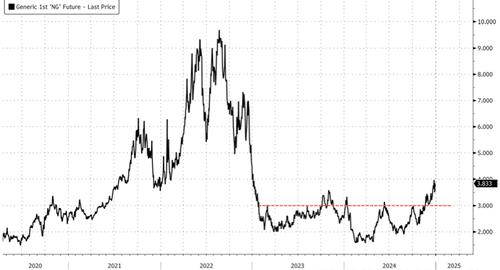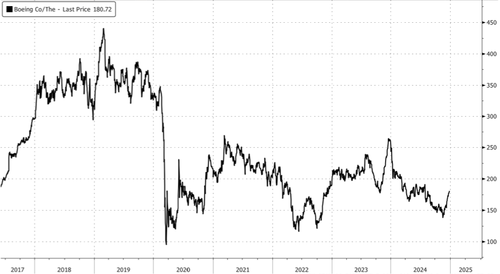Authored by James Varney via RealClearInvestigations,
For four years, President Joe Biden has described climate change as an existential threat requiring a whole lot of government response and trillions of dollars in new spending to force America off fossil fuels.

President-elect Donald Trump, on the other hand, opts for a three-word approach: “Drill, baby, drill.”
Energy is just one of the areas – from foreign policy and law enforcement to taxes, immigration, regulation, and almost every other issue – where the two leaders have sharply divergent views. But even as Trump works to reverse many of Biden’s policies and the current administration seeks to entrench its priorities in its final days, energy debates show no president has a magic wand that can undo every policy enacted by his predecessor.
Trump has made it clear he wants to realign U.S. energy policy toward cheap, abundant energy and away from expensive, emerging renewable sources, many of which rely on government subsidies. But experts say his options may be limited in cases where Congress approved spending bills, contracts were signed, or even where he encounters pushback from reluctant “green” enterprises that have relied on government largesse in the push for a “NetZero” future.
“Congress would have to repeal some of that,” said Travis Fisher, the director of energy and environmental policy studies at the libertarian Cato Institute, referring to hundreds of billions in climate-relate funding, including in the Inflation Reduction Act and other legislation passed during the last four years. “The question in some cases will be, ‘Do you try to improve what’s been done or repeal it?’ And then, if there are grants that have already gone out the door, those would be hard to claw back. But there are still a lot of targets for quick changes on day one.”
Some Trump supporters think the avenues that are open to a new administration, as well as Trump’s track record, give cause for optimism for those who want to reduce government spending or let the markets determine energy prices and accessibility.
“When Trump promises something he usually delivers, and I would expect to see significant changes in energy policy with him,” said Geoffrey Pohanka, the 2023 chairman of the National Automobile Dealers Association.
One of Trump’s clearest paths to reform would be reversing the Biden administration’s moves to restrict drilling leases on federal lands. While Biden did not achieve his stated aim of halting all offshore drilling, he did try repeatedly to keep new exploration to a minimum while delaying existing permits. Alaska offered clear bookends of Biden’s anti-fossil fuel position. Upon taking office, he immediately suspended all nine Alaskan leases permitted during Trump’s first term, and in December, Biden’s Interior Department announced an auction of 400,000 acres for exploration in Alaska – the absolute minimum required by law.
Possible Target: Electric Vehicles
Trump can also counter Biden’s commitment to electric vehicles, which increasingly looks like a plan to force manufacturers to build cars that the public does not want to buy. Government planners envision 33 million EVs on the road by 2030, up from the current 3.5 million light-duty EVs registered in the U.S. While Detroit executives have publicly backed EVs and are eager for government subsidies in that market, consumers have proved less enthusiastic. Ford, which lost more than $1.2 billion in the third quarter alone on its EVs, announced it would suspend building electric versions of its F-150 pickup, which has long been one of America’s best-selling vehicles. GM leadership continues to sound bullish on EVs, but the company is also losing money on them and has cut another 1,000 jobs.
A Trump pushback could begin with scrapping one Biden goal linked to its effort to force EV manufacturing: the administration’s mandate that new vehicles must average 46 miles per gallon by 2026.
Trump could also apply pressure by kicking out some of the government props to the green energy market. He could end Biden’s generous tax credits for EV leasing, which account for 85% of EVs on U.S. roads. Trump could also abolish federal tax incentives that encourage EV buying, and stop loans to struggling manufacturers of other renewable energy equipment, such as off-shore wind.
“The elimination of the tax credit for leases would essentially do away with the majority of Federal Government EV subsidies,” Pohanka said. “As for California’s emission exemption, the President’s directive to the EPA would eliminate it.”
But such a move ironically would likely face strong pushback from automakers. Despite their heavy losses on EVs, Detroit executives want to protect their huge investments in EVs that have been made, in part, via congressional action, and smaller outfits in myriad districts enjoy Washington’s largesse and will likely lobby for their continuance.
“The (Inflation Reduction Act) subsidies help to create constituencies that are going to fight hard to keep these handouts,” said Daren Bakst, an energy expert at the conservative Competitive Enterprise Institute. “While it will be difficult to get rid of some of these green subsidies, it is imperative that legislators put the interests of the American people over the interests of special interests.”
Possible Target: Green Infrastructure
Trump can counter efforts to make Americans buy EVs by stopping funds for Biden’s “National Electric Vehicle Infrastructure” plan. This ambitious proposal – which was developed by several executive branch agencies – includes $7.5 billion to build 500,000 EV charging stations around the country and was widely criticized earlier this year as only a handful of stations have been built since Biden unveiled the proposal in December 2021. As a result, much of the money has not been spent. That might allow Congress or perhaps the administration to freeze spending on the plan. This could provide huge savings in the future, too, as government planners acknowledge a full-blown national network of charging stations would cost between $53 billion and $127 billion and would rely on the private sector to do much of the heavy lifting, according to the plan’s annual report.
While Biden and global warming alarmists say the plan builds necessary infrastructure, critics say it should be scrapped because it rests on fanciful assumptions and timetables.
“This whole thing is really more of a pipe dream,” said Mark Mills, the Executive Director of the National Center on Energy Analytics (NCEA). “To pull this off, you would need something like $4 trillion worth of hardware, and that’s not counting additional power plants you’d need and the national grid to handle the expected growth in power demand. You’ve also got land issues – where are you going to put all this?”
In other words, the national infrastructure plan rests on an “if we build it, they will come” dream, according to auto market experts and economists. Even the people at Climate Crisis acknowledged in November that “the dream of the $25,000 EV is dead.”
“This plan is another example of the Sovietization of the economy,” said Walter Block, an economics professor at Loyola University in New Orleans. “This is essentially a ‘Five Year Plan.’”
A Trump administration looking to trim will find other federal departments and agencies that have swollen remarkably during Biden’s four years.
Possible Target: The EPA
Experts say a far more ambitious effort would be reforming the large and extensive government bodies that carry out Washington’s energy policy. These would include the Department of Energy, of course, but also the Departments of Transportation and Interior, the Federal Highway Administration, and, perhaps most especially, the Environmental Protection Agency, a regulatory body the Biden administration has transformed into a cash cow for green energy.
In the last four years, the EPA’s “budgetary resources” increased by more than 400%, rising from $17.2 to $84.4 billion, according to the Treasury Department’s tracker. At the same time, according to the agency’s inspector general, the Biden administrator has created an “incredibly complex” investment bank within the EPA to award much of that money to green groups.
Biden officials have insisted there is “no turning back” on EPA-funded programs such as the $27 billion it dished out to nonprofits via the new Greenhouse Gas Reduction Fund. RealClearInvestigations has reported that much of this money has been awarded to outfits with strong ties to the Democratic party.
“The situation at the EPA is troubling – it’s not an agency that is supposed to be in the spending, or giving out money business at all,” Bakst said. “It’s not like this is a small amount of money that the EPA is doling out, and much of the money is going to the creation of what amount to slush funds for nonprofits.”
Mandy Gunasekara, who led the EPA at the end of Trump’s first term, said the new administration should try to claw back billions earmarked for global warming measures, though she acknowledged “it would be cleaner with Congressional action.”
In addition, she said unobligated “funds can be redirected,” a tactic that has been used by many administrations. Those efforts, like the expected new leases and permits federal agencies will green light under Trump, could face court challenges that would, at the very least, slow Trump’s actions.
Gunasekara has fleshed out a reform agenda in the EPA chapter she contributed to “Project 2025,” a blueprint for conservative governance prepared by the Heritage Foundation that Democrats falsely labeled a Trump manifesto.
The EPA, she wrote, “has been a breeding ground for expansion of the federal government’s influence and control across the economy. Embedded activists have sought to evade legal restraints in pursuit of a global, climate-themed agenda, aiming to achieve that agenda by implementing costly policies that otherwise have failed to gain the requisite political traction in Congress.”
With a few steps, the Trump administration could profoundly shift the EPA narrative and return it to its familiar duties, according to Gunasekara. In some cases, this would involve action by the Trump administration, and in others, it could be achieved simply by ignoring or stalling a raft of regulations put in under Biden. These steps would include:
- Eliminating the Office of Environmental Justice and External Civil Rights, which has become a stand-alone office.
- Reviewing the EPA’s grants to ensure taxpayer money goes to groups “focused on tangible environmental improvements free from political affiliations.” This would be accompanied by a stop on “all grants to advocacy groups.”
- Making “new petitions for rule reconsiderations and stays of rules.”
- Reassessing any “sue and settle” cases and increasing “public notification and participation” in legal matters.
- Removing the Greenhouse Gas Reporting Program “for any source category that is not currently being regulated.”
Although some of Biden’s initiatives have been approved by Congress, Gunasekara told RCI that “many EPA actions in liberal administrations have simply ignored the will of Congress, aligning instead with the goals and wants of politically connected activists.”
Possible Target: The Bureaucracy
A Trump administration looking to trim will also encounter other federal departments and agencies that have swollen remarkably during Biden’s four years. While not seeing the spectacular growth of the EPA, the Energy Department saw its “budgetary resources” more than double from $61.1 billion in FY2021 to $129.9 billion in FY2022. In the most recent fiscal year, Energy had $153.4 billion. The Department of Interior, meanwhile, saw its money balloon from FY2021’s $48.8 billion to FY2022’s $84.1 billion, and it now has $92.1 billion, according to the Treasury Department’s figures.
“Closing vast, unnecessary and unconstitutionally justified departments would also save money,” said H. Sterling Burnett, director of climate and environmental policy at the Heartland Institute, a longtime critic of apocalyptic global warming predictions. “The latter won’t just save money now, but will reduce deficit spending going forward, leaving it in the hands of the states or the people.”
Such moves may also be proposed by the incoming Department of Government Efficiency, a new arm led by Elon Musk and Vivek Ramaswamy that is expected to suggest widespread reductions or eliminations of federal programs in an effort to trim the national debt that currently stands at more than $36 trillion.
Trump’s nominee for energy secretary, Chris Wright, an energy executive and unapologetic booster of fossil fuels and natural gas, is expected to cast a gimlet eye on much of the DoE’s actions in the past four years. But just what might happen remains unclear; a Trump spokesperson did not respond to RCI’s requests for comment.
Much of this money can be saved simply by not being spent, Fisher said.
“The Department of Energy’s Loan Programs Office is sitting on big piles of money,” he said. “The idea would be to hit pause on new loan guarantees. It’s a strategy where you either sit on appropriated funds and do nothing, or you redirect and move forward with new priorities.”
Whatever measures the new administration takes will be welcome, said Michael Chamberlain, director of the conservative Protect the Public’s Trust.
“The government is throwing massive sums around, but the devil is in the details,” he said. “The American public would be forgiven if they believed the purpose of these programs was more about rewarding friends than solar panels or high-speed internet or EV charging.”













